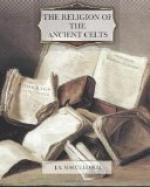As Cuchulainn grew up, his strength, skill, wisdom, and beauty were unsurpassed. All women fell in love with him, and to forestall a series of bonnes fortunes, the men of Ulster sought a wife for him. But the hero’s heart was set on Emer, daughter of Forgall, whom he wooed in a strange language which none but she could understand. At last she consented to be his wife if he would slay a number of warriors. Forgall was opposed to the match, and with a view to Cuchulainn’s destruction suggested that he should go to Donall in Alba to increase his skill, and to Scathach if he would excel all other warriors. He agreed, provided that Forgall would give him whatever he asked for on his return. Arrived in Alba, he refused the love of Donall’s daughter, Dornolla, who swore to be avenged. Thence he went to Scathach, overcoming all the dangers of the way, leaping in safety the gulf surrounding her island, after essaying in vain to cross a narrow, swinging bridge. From Scathach he learned supreme skill in arms, and overcame her Amazonian rival Aife. He begat a son by Aife, and instructed her to call him Conla, to give him his father’s ring, to send him to seek Cuchulainn, and to forbid him to reveal his name. In the sequel, Cuchulainn, unaware that Conla was his son, slew him in single combat, too late discovering his identity from the ring which he wore. This is the well-known saga formula of Sohrab and Rustum, of Theseus and Hippolytus. On his return from Scathach’s isle Cuchulainn destroyed Forgall’s rath with many of its inmates, including Forgall, and carried off Emer. To the ten years which followed, during which he was the great champion of Ulster, belong many tales in which he figures prominently. One of these is The Debility of the Ultonians. This was caused by Macha, who, during her pregnancy, was forced to run a race with Conchobar’s horses. She outran them, but gave birth immediately to twins, and, in her pangs, cursed the men of Ulster, with a curse that, in time of oppression, they would be overcome with the weakness of childbirth. From this Cuchulainn was exempt, for he was not of Ulster, but a son of Lug.[456] Various attempts have been made to explain this “debility.” It may be a myth explaining a Celtic use of the “couvade,” though no example of a simultaneous tribal couvade is known, unless we have here an instance of Westermarck’s “human pairing season in primitive times,” with its consequent simultaneous birth-period for women and couvade for men.[457] Others, with less likelihood, explain it as a period of tabu, with cessation from work and warfare, at a funeral or festival.[458] In any case Macha’s curse is a myth explanatory of the origin of some existing custom, the duration of which is much exaggerated by the narrator. To this period belong also the tale of Cuchulainn’s visit to Elysium, and others to be referred to later. Another story describes his attack upon Morrigan because she would neither yield up the cows which she was




